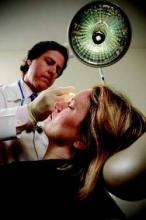WASHINGTON – OnabotulinumtoxinA injections significantly decreased both emergency department visits and hospitalizations for chronic migraine for up to 1 year among patients who had previously been admitted for the condition.
By 6 months after the first injection, ED visits were down 32% and hospitalizations were down 52%, Dr. Noah Rosen said at the annual meeting of the American Academy of Neurology.
Dr. Rosen of the Hofstra North Shore Headache Center in Great Neck, N.Y., based his findings on data from the MarketScan health resource utilization database, which captures about 66 million patient visits per year. The initial cohort included 3,840 patients who had a new diagnosis of chronic migraine with at least one subsequent onabotulinumtoxinA treatment within 6 months of diagnosis. These were followed for 1 year before the diagnosis and for 1 year after treatment began. The cohort comprised 1,831 patients at 6 months and 936 patients at 12 months.
Most (80%) of the population already had a diagnosis of migraine before the chronic migraine diagnosis; about half also had another headache disorder. They were a mean of 46 years old and were predominantly women. Depression was present in 20% and anxiety in about 11%. They also were taking one to three other headache medications, including triptans, opioids, nonsteroidal anti-inflammatory drugs, muscle relaxants, benzodiazepines, barbiturates, and ergots. The time from diagnosis to first injection was about a month, with subsequent injections 90 days apart.
The 6-month improvements in ED visits and hospitalizations remained steady, Dr. Rosen said. The reductions at 9 months in ED visits and hospitalizations were identical to those at 6 months. At 12 months, they had declined 25% and 47%, respectively, from baseline.
“This shows that the immediate benefits, which have been reported before, are maintained for at least a year,” he noted.
Dr. Rosen is on the speakers’ board and has been an advisor for Allergan and Zogenix. He also has received remuneration from Curelator.
On Twitter @alz_gal

